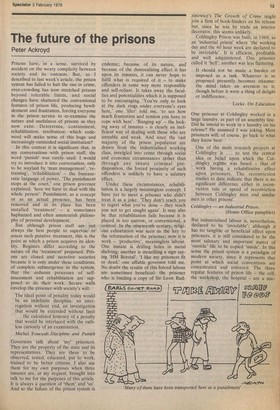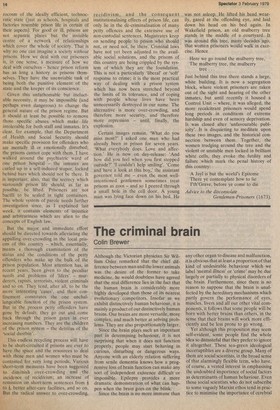The future of the prisons
Peter Ackroyd
Prisons have, in a sense, survived by accident on the weary complicity between society and its outcasts. But, as I described in last week's article, the prison system has failed to halt the rise in crime, over-crowding has now stretched prisons beyond tolerable limits, and social changes have shattered the conventional features of prison life, producing bewilderment and frustration, forcing everyone in the prison service to re-examine the nature and usefulness of prisons as they now exist. Deterrence, containment, rehabilitation, retribution: which codeword will make sense of this huge and increasingly outmoded social institution?
In this context it is significant that, in my conversations with prison staff, the word 'punish' was rarely used. I would try to introduce it into conversation, only to be waylaid by 'man management', 'retraining', 'rehabilitation' – the bureaucratic language of power. 'The punishment stops at the court,' one prison governor explained, 'here we have to deal with the whole person'. Punishment, as a concept or as an actual presence, has been removed and in its place has been installed 'treatment' – a sometimes haphazard and often amateurish philosophy of personal development.
But although prison staff are not always the best people to supervise or assess such putative treatment, this is the point at which a prison acquires its identity. Regimes differ according to the nature of the 'treatment' proposed. Prisons are closed and secretive societies because it is only under these conditions, of complete submergence in the system, that the arduous processes of selfassessment and rehabilitation are supposed to do their work. Secure walls envelop the prisoner with society's will: The ideal point of penality today would be an indefinite discipline: an interrogation without end, an investigation that would be extended without limit ... the calculated leniency of a penalty that would be interlaced with the ruthless curiosity of an examination.
Michel Foucault. Discipline and Punish Governors talk about 'my' prisoners. They are the property of the state and its representatives. They are there to be observed, tested, educated, put to work, trained to be better citizens. I also use them for my own purposes when three inmates are, at my request, brought into talk to me for the purposes of this article. It is always a question of 'them' and 'us'. And so the failure of the prison system is endemic; because of its nature, and because of the demoralising effect it has upon its inmates, it can never hope to fulfil what is required of it – to make offenders in some way more responsible and self-reliant. It takes away the faculties and potentialities which it is supposed to be encouraging. 'You've only to look at the dark rings under everyone's eyes here,' one 'lifer' told me, `to see how much frustration and tension you have to cope with here'. 'Banging up' – the locking away of inmates – is clearly an inefficient way of dealing with those who are unstable and weak. And since the vast majority of the prison population are drawn from the industrialised working class, inveigled into crime through social and economic circumstances rather than through any innate criminal predisposition, the forced proximity of such offenders is unlikely to have a salutary effect.
Under these circumstances, rehabilitation is a largely meaningless concept. I have yet to meet a prisoner who didn't treat it as a joke: 'They don't teach you to regret what you've done – they teach you not to get caught again'. It may also be that rehabilitation fails because it is placed in too narrow, or conventional, a context. In the nineteenth century, religious exhortation was seen as the key to the reformation of the prisoner; now it is work – 'productive', meaningless labour. One inmate is drilling holes in metal shelving; another is stencilling a sign saying `HM Borstal'. 'I like my prisoners fit or dead,' one affable governor told me. No doubt the results of this forced labour are sometimes beneficial: the prisoner who is binding a copy of Sir Leon Rad zinowicz's The Growth of Crime might join a firm of book-binders on his release but, since he was by trade an interior decorator, this seems unlikely.
Coldingley Prison was built, in 1969, as an 'industrial prison' where 'the working day and the 40 hour week are declared to be inviolable'. It is efficient, profitable and well administered. One prisoner called it 'hell'; another was less flattering.
It should not be made a burden or imposed as a task. Whatever is so proposed presently becomes irksome: the mind takes an aversion to it, though before it were a thing of delight or indifference.
Locke. On Education One prisoner at Coldingley worked in a large laundry, as part of an assembly line. Did he intend to work in a laundry on his release? He assumed I was joking. Most prisoners will, of course, go back to what they know best: One of the main research projects at Coldingley is ... to test the central idea or belief upon which the Coldingley regime was based – that of work having a rehabilitative effect upon prisoners. The reconviction studies to date indicate that there is no significant difference either in reconviction rate or speed of reconviction between Coldingley men and similar men in other prisons'.
Coldingley — an Industrial Prison.
(Home Office pamphlet) But industrialised labour is, nevertheless, declared to be 'inviolable'; although it has no tangible or beneficial effect upon prisoners, it is still considered to be the most salutary and important aspect of 'outside' life to be copied 'inside'. In this sense the prison system is a paradigm of modern society, since it represents that point at -which social conventions are concentrated and enforced. The three regular features of prison life – the cell, the workshop, the hospital – are a mic rocosm of the ideally efficient, technocratic state (just as schools, hospitals and factories resemble prison life in certain of their aspects). For good or ill, prisons are not separate places but the invisible centre of a network of relationships which cover the whole of society. That is why no one can imagine a society without prisons. How we deal with our prisoners is, in one sense, a measure of how we deal with ourselves — hence prison reform has as long a history as prisons themselves. They have the unenviable task of being both the punitive element of the state and the keeper of its conscience.
Given this unfathomable but ineluctable necessity, it may be impossible (and perhaps even dangerous) to change the general nature of the prison regime. But it should at least be possible to remove those specific abuses which make life intolerable for both staff and inmates. It's clear, for example, that the Department of Health and Social Security should make specific provision for offenders who are mentally ill or emotionally disturbed; the prisons cannot cope with them. I have walked around the psychiatric ward of one prison hospital — the inmates are curled up in a self-induced stupor, locked behind bars which should not be there. It is important, also, that the secrecy which surrounds prison life should, as far as possible, be lifted. Prisoners are not bacilli to be sealed in tight containers. The whole system of parole needs further investigation since, as I explained last week, it contains elements of injustice and arbitrariness which are alien to the concepts of English law.
But the major and immediate effort should be directed towards alleviating the appalling over-crowding in the local prisons of this country — which, essentially, means a thorough examination of the status and the conditions of the petty offenders who make up the bulk of the prison population. Most attention has, in recent years, been given to the peculiar needs and problems of 'lifers' — murderers. rapists, terrorists, violent criminals and so on. They tend, after all, to be the more interesting 'cases', and their confinement constitutes the one unchallangeable function of the prison system. But in the process petty offenders have gone by default; they go out and come back through the prison gates in ever increasing numbers. They are the children of the prison system — the detritus of the 'social dustbin'.
This endless recycling process will have to be short-circuited if prisons are ever to have the space and the resources to deal with those men and women who must be contained for very long periods. Various short-term measures have been suggested to diminish over-crowding and the incidence of recidivism; an increase of remission on short-term sentences from to better after-care facilities, and so on. But the radical answer to over-crowding, recidivism, and the consequent institutionalising effects of prison life, can only lie in the de-criminalisation of many petty offences and the extensive use of non-custodial sentences. Magistrates keep on sending people to prison who should not, or need not, be there. Criminal laws have not yet been adjusted to the available social solutions, and the prisons of this country are being crippled by the system of which they are the foundation. This is not a particularly 'liberal' or 'soft' response to crime; it is the most practical way of dealing with a prison system which has now been stretched beyond the limits of its tolerance, and of coping with people whose lives have been unnecessarily destroyed in our name. The alternative is more over-crowding, and therefore more security, and therefore more repression — until, finally, the explosion.
Certain images remain. 'What do you miss most?' I asked one man who had already been in prison for seven years. 'What everybody does. Love and affection.' He is now on day-release: 'And how did you feel when you first stepped outside?' I couldn't help smiling'. 'Come and have a look at this boy,' the assistant governor told me — even the most wellintentioned gentlemen sometimes treat prisons as zoos — and so I peered through a small hole in the cell door. A young man was lying face down on his bed. He was not asleep. He lifted his head wearily, gazed at the offending eye, and laid down his head on his bed again. In Wakefield prison, an old mulberry tree stands in the middle of a courtyard. It was around this tree, many decades ago, that women prisoners would walk in exercise. Hence Here we go round the mulberry tree, The mulberry tree, the mulberry tree . .
Just behind this tree there stands a large, white building. It is now a segregation block, where violent prisoners are taken out of the sight and hearing of the other inmates, but until recently it housed a Control Unit — where, it was alleged, the more recalcitrant prisoners would spend long periods in conditions of extreme hardship and even of sensory deprivation. It was closed after 'unfavourable publicity'. It is disquieting to meditate upon these two images, and the historical connection between them. Together, the women trudging around the tree and the violent or unstable men locked in brilliant white cells, they evoke the futility and failure which mark the penal history of this country: A Jayl is but the world's Epitome There ye contemplate how to lie I'th'Grave, before ye come to die Advice to the disconsolate Gentlemen-Prisoners (1673).



































 Previous page
Previous page